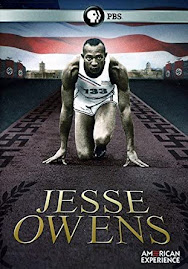Trouble: Will the non-fiction visual biography reveal as much as the non-fiction print biography?
DVD biography: Jesse Owens. American Experience. 2012.
Print biography: Stanmyre, Jackie F. Jesse Owens: Facing Down Hitler. Game-Changing Athletes. Cavendish Square, 2016.
To be as fair to both print and visual, I read half of the biography, then watched the DVD, then read the rest of the biography.
The book is a YA biography and quite good. The author is honest and measured. She straightforwardly points out the conditions of Jesse Owens's life, including the prejudice he faced. She details the pressure he received when many Americans wished to boycott the 1936 Olympics. And she explains quite objectively the positions of those who wanted Jesse Owens to attend the Olympics in Berlin and those who didn't.
The DVD is more of a narrative. It has the added benefit, of course, of more visuals, and actual film from the 1936 Olympics. It also has the rather notable addition of sports experts talking specifically about sports. Yet, by necessity, it rarely pauses and says, "Actually, we don't have enough material about this particular event."
The DVD also has a far narrower focus. Although the book is subtitled Facing Down Hitler, it has a broader focus, delivering a full picture of Owens' life. In comparison, the DVD, titled Jesse Owens, concentrates more than 1/3 of its 60 minutes on the 1936 Olympics, and it ends rather abruptly.
I learned from the book that although Jesse Owens struggled after the
Olympics, he had strong opinions about sports and how they should be
used in the fight against discrimination--namely, he thought competition
should override any militant action. I also learned that he was awarded the Presidential Medal of Freedom in 1976.
The DVD concentrates, rightly, on the discrimination Owens faced when he returned home. He was very popular, in part
because he represented a stand against Hitler. However, his popularity
faded and he turned to making money in a variety of non-sports ways (in part by necessity since he was suspended by the stupendously corrupt AAU--I guess nothing changes). The DVD goes on to deliver a few tantalizing comments about how celebrity figures
are often used for political ends. Those comments never go anywhere.
What stood out to me in both the book and the DVD was the power of the personal relationship. Owens and his high school coach, Charles Riley; Owen and his college coach, Larry Snyder; Owens and German athlete Luz Long, who befriended him at the Olympics and cared more about sports than any ideology. These relationships crop up again and again in both sources and give one faith in the human race.
Luz Long and Jesse Owens are an especially endearing example. They competed against each other in the long jump. They were nearly equal in skill and power. Luz gave Jesse Owens' pointers (there is some doubt here as to when or if the men met before the competition). They pushed each other to excel, breaking record after record during the actual competition. Jesse took the gold with a world record jump that wasn't broken until the 1980s by Carl Lewis. Afterwards, Luz and Jesse walked arm in arm around the stadium. They stayed in contact by letters until Luz died in WWII.
This is what sports is supposed to do. This is what Coach refers to when he states that the best game he ever coached wasn't one he won but one where both teams played to their very best.
So, I recommend the DVD simply due to the actual footage. But I recommend supplementing the DVD with the book!




No comments:
Post a Comment